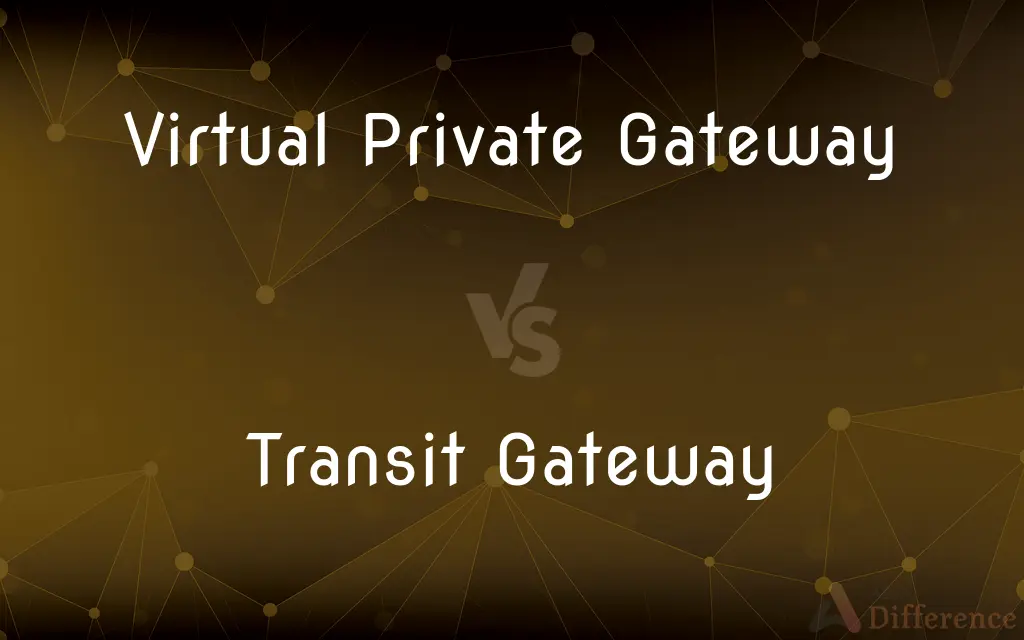Virtual Private Gateway vs. Transit Gateway — What's the Difference?
By Fiza Rafique & Urooj Arif — Published on March 14, 2024
A Virtual Private Gateway (VPG) connects an AWS VPC to on-premises networks via VPN, while a Transit Gateway (TGW) connects multiple VPCs, VPNs, and AWS accounts within a single network transit hub.

Difference Between Virtual Private Gateway and Transit Gateway
Table of Contents
ADVERTISEMENT
Key Differences
A Virtual Private Gateway (VPG) is a VPN concentrator on the Amazon side of a VPN connection that is attached to a VPC. It is designed for a single VPC to establish a secure and private connection to a corporate network or data center. VPGs support site-to-site VPN connections and enable instances in a VPC to communicate with a corporate network.
Transit Gateway (TGW), on the other hand, acts as a network transit hub, connecting multiple VPCs, VPN connections, and other services within a single gateway. It simplifies network management and reduces operational complexity by allowing transitive routing between all connected networks. TGW is designed to scale horizontally, providing you with the ability to connect thousands of VPCs and on-premises networks.
While a Virtual Private Gateway allows a single VPC to connect to external networks, a Transit Gateway provides a more scalable and efficient way to manage connectivity across multiple VPCs and networks. This means that for organizations with multiple VPCs or those requiring complex routing needs, a TGW is more suitable.
In terms of configuration, setting up a VPG involves creating a VPN connection between your VPC and the external network. This setup is relatively straightforward but needs to be replicated for each VPC requiring external access. Conversely, setting up a TGW involves configuring the gateway and attaching VPCs, VPNs, or AWS Direct Connect connections to this central hub, streamlining network administration.
Regarding cost, the pricing models for VPG and TGW differ. VPG costs are primarily associated with VPN connection hours and data transfer rates. TGW costs, while also based on data transfer and connection hours, can add up more quickly due to the larger scale of operations it supports. However, TGW can offer cost savings through efficient network architecture and reduced complexity.
ADVERTISEMENT
Comparison Chart
Purpose
Connects one VPC to on-premises networks via VPN
Connects multiple VPCs, VPNs, and accounts
Connectivity
Single VPC to external network
Multiple VPCs, VPNs, to a single network hub
Use Case
Suitable for simple, one-to-one network connections
Ideal for complex, multi-account networking needs
Configuration Complexity
Relatively simple, but repetitive for multiple VPCs
More complex, but centralized for efficiency
Scalability
Limited to the VPCs it is directly connected to
High, supports thousands of VPC and VPN connections
Pricing
Based on VPN connection hours and data transfer rates
Based on connection hours and higher data transfer
Routing
Static and dynamic routing support for VPN connections
Advanced routing options for complex architectures
Integration
Direct connection to a single VPC
Integrates with Direct Connect, VPCs, and VPNs
Management
Managed per VPC
Centralized management for all connected networks
Compare with Definitions
Virtual Private Gateway
A VPN concentrator for AWS VPCs, enabling secure connections to external networks.
The company connected its cloud resources to the on-premises data center using a VPG.
Transit Gateway
Reduces network complexity and operational overhead.
Network administrators used TGW to streamline the management of inter-VPC communications.
Virtual Private Gateway
Allows for both static and dynamic routing configurations.
The VPG dynamically routed traffic between the VPC and the corporate network.
Transit Gateway
Enables large-scale network architecture within AWS.
By using TGW, the organization scaled its network to include hundreds of VPCs.
Virtual Private Gateway
Supports site-to-site VPN connections for secure data transmission.
Through the VPG, encrypted data travels safely between the cloud and the corporate network.
Transit Gateway
Offers centralized management for a vast network infrastructure.
TGW provided a unified view for monitoring and managing the entire cloud network.
Virtual Private Gateway
Integrates with AWS VPC for extending on-premises networks.
The VPG was attached to the VPC to facilitate direct access to internal company resources.
Transit Gateway
A central hub that connects multiple VPCs, VPNs, and AWS accounts.
The TGW simplified the network by connecting all regional VPCs through a single gateway.
Virtual Private Gateway
Requires separate setup for each VPC connection.
Each VPC had its VPG for dedicated connectivity to the external network.
Transit Gateway
Supports complex routing across AWS and on-premises environments.
TGW managed the routing policies for traffic between the cloud environments and the data center.
Common Curiosities
How does Transit Gateway improve network architecture?
By centralizing and simplifying connectivity between multiple VPCs, VPNs, and AWS accounts.
Can Transit Gateway connect to on-premises networks?
Yes, through VPN connections and AWS Direct Connect, TGW can connect to on-premises networks.
What is the main purpose of a Virtual Private Gateway?
To connect an AWS VPC to an on-premises network securely via VPN.
Can I use a Virtual Private Gateway for connecting multiple VPCs?
No, VPG is intended for one-to-one connections; TGW is used for connecting multiple VPCs.
Is it possible to switch from a Virtual Private Gateway to a Transit Gateway?
Yes, but it requires reconfiguring your network architecture to integrate with TGW.
Is Transit Gateway more cost-effective than using multiple Virtual Private Gateways?
While TGW might have higher upfront costs, it can be more cost-effective for complex networks due to reduced complexity and management overhead.
Which is better for a small business with a single VPC?
A Virtual Private Gateway is typically more suitable for small businesses with simple networking needs.
How does Transit Gateway handle routing between connected networks?
TGW uses route tables to manage traffic flow between all connected VPCs, VPNs, and other services.
Do both VPG and TGW support encrypted connections?
Yes, both support encrypted VPN connections for secure data transmission.
How do I choose between a Virtual Private Gateway and a Transit Gateway?
Consider your network complexity, the number of VPCs, and future scalability needs when choosing between VPG and TGW.
Share Your Discovery

Previous Comparison
Disinformant vs. Misinformant
Next Comparison
Socialism vs. Democratic SocialismAuthor Spotlight
Written by
Fiza RafiqueFiza Rafique is a skilled content writer at AskDifference.com, where she meticulously refines and enhances written pieces. Drawing from her vast editorial expertise, Fiza ensures clarity, accuracy, and precision in every article. Passionate about language, she continually seeks to elevate the quality of content for readers worldwide.
Co-written by
Urooj ArifUrooj is a skilled content writer at Ask Difference, known for her exceptional ability to simplify complex topics into engaging and informative content. With a passion for research and a flair for clear, concise writing, she consistently delivers articles that resonate with our diverse audience.
















































